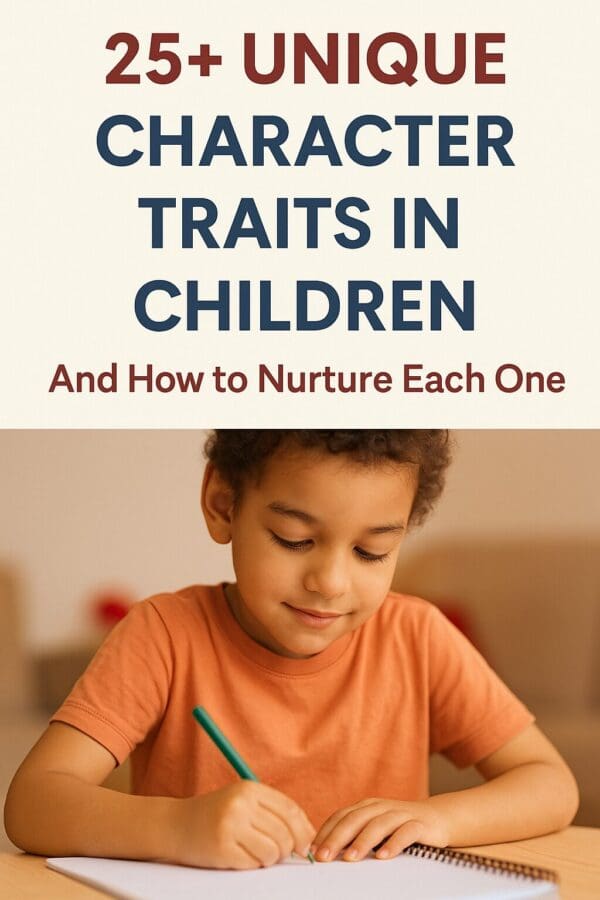25+ Unique Character Traits in Children (And How to Nurture Each One)
Every child is born with a unique personality. As parents, it’s our job to observe, encourage, and celebrate the unique character traits in children that make them who they are. These special traits are the seeds of confidence, compassion, creativity—and even leadership.
In this post, we’ll break down a variety of distinct character traits children might exhibit and how you can nurture them at home. Whether your child is empathetic, persistent, quirky, or naturally curious, these ideas will help you guide their growth without trying to mold them into someone they’re not.
Heads up: This post may include affiliate links. As an Amazon Associate, I earn from qualifying purchases—at no extra cost to you. Full privacy policy and disclosure here.

Why It Matters to Recognize Unique Character Traits in Children
Understanding your child’s individual strengths helps you:
- Encourage self-confidence
- Choose the right tools for growth
- Build stronger parent-child communication
- Support emotional intelligence and resilience
When children feel seen for who they truly are, they thrive.
25+ Unique Character Traits in Children (and How to Support Them)
Here’s a breakdown of some common (and not-so-common) traits, plus practical ways to nurture each one:
1. Curiosity
Always asking “why?” and exploring the world around them.
🧠 Nurture it by:
- Encouraging questions without rushing answers
- Providing science kits, magnifying glasses, or STEM toys like this experiment kit
- Reading fact-based books together
2. Empathy
Sensitive to the feelings of others and quick to offer kindness.
🧠 Nurture it by:
- Reading books with emotional themes (like “The Invisible Boy”)
- Modeling gentle responses to emotions
- Naming feelings often
💡 Related read: How to Deal With Ungrateful Kids – 5 Brilliant Strategies That Work
3. Creativity
Expresses themselves through art, storytelling, or imaginative play.
🧠 Nurture it by:
- Offering open-ended toys like this magnetic building block set
- Creating a “maker” station at home
- Letting them be messy and expressive
4. Leadership
Takes initiative and helps guide others.
🧠 Nurture it by:
- Encouraging them to lead a family activity
- Discussing responsibility and fairness
- Reading books about leadership (like “What Do You Do With a Chance?”)
5. Persistence
Refuses to give up, even when things are hard.
🧠 Nurture it by:
- Praising effort over results
- Using phrases like “You’re working hard!” instead of “You’re so smart!”
- Letting them try (and fail) safely
📚 Check out How to Teach Perseverance to Kids
6. Introversion
Recharges alone and prefers quiet activities.
🧠 Nurture it by:
- Respecting their need for downtime
- Creating cozy reading nooks or calming corners
- Choosing solo-play items like calming sensory kits
🧠 Related: Thriving as an Introvert Mom
7. Optimism
Sees the bright side and remains hopeful.
🧠 Nurture it by:
- Playing gratitude games
- Using a kids’ gratitude journal
- Sharing daily positives at dinner
8. Strong-Willed
Knows what they want and won’t easily back down.
🧠 Nurture it by:
- Giving choices whenever possible
- Staying calm and consistent
- Redirecting energy into decision-making tasks
🔗 Read: When Setting Limits With Your Strong-Willed Child Isn’t Working
9. Logical
Loves solving puzzles and spotting patterns.
🧠 Nurture it by:
- Providing logic-based games like Rush Hour Jr.
- Letting them help with real-life problem-solving
10. Kindness
Acts with warmth and compassion naturally.
🧠 Nurture it by:
- Catching them being kind
- Reading books like “Have You Filled a Bucket Today?”
11. Humor
Quick-witted and loves to laugh.
🧠 Nurture it by:
- Laughing together every day
- Reading joke books or writing their own
12. Adventurous
Loves taking risks, exploring, and trying new things.
🧠 Nurture it by:
- Planning mini family adventures
- Encouraging outdoor time and travel experiences
13. Orderly
Organized, tidy, and enjoys routines.
🧠 Nurture it by:
- Giving them control of a chore chart
- Using checklists or planners for kids
📝 Try: Daily Toddler Schedule Ideas
14. Spiritual
Feels connected to something larger, like nature or faith.
🧠 Nurture it by:
- Having quiet moments for reflection
- Talking about values, beliefs, and wonder
15. Courageous
Willing to face fears or take a stand.
🧠 Nurture it by:
- Celebrating bravery, big or small
- Reading stories with brave characters
16. Compassionate
Feels deeply and shows concern for others.
🧠 Nurture it by:
- Encouraging volunteering or kindness projects
- Watching documentaries or shows about different cultures
🔗 Outbound link: Verywell Family’s list of emotional development books
17. Independent
Wants to do things their own way.
🧠 Nurture it by:
- Letting them take the lead on small tasks
- Offering age-appropriate responsibilities
18. Inquisitive
Always investigating or experimenting.
🧠 Nurture it by:
- Visiting museums or nature centers
- Offering tools like binoculars or field kits
19. Determined
Fiercely committed to goals.
🧠 Nurture it by:
- Helping them set and track goals
- Talking about famous role models who overcame challenges
20. Grateful
Shows appreciation for life and others.
🧠 Nurture it by:
- Creating gratitude rituals
- Using a thankfulness board or jar
21. Mindful
Tuned into the present moment.
🧠 Nurture it by:
- Practicing mindfulness together
- Trying kid-friendly breathing cards or apps
22. Resilient
Bounces back after hard times.
🧠 Nurture it by:
- Telling stories of their own resilience
- Focusing on growth over perfection
✨ Related: How to Raise Emotionally Resilient Kids
23. Playful
Always ready for fun and silliness.
🧠 Nurture it by:
- Joining in their games
- Offering time for free, unstructured play
24. Thoughtful
Takes time to reflect before speaking or acting.
🧠 Nurture it by:
- Allowing pauses in conversation
- Giving space for them to journal or draw
25. Helpful
Loves assisting and being useful.
🧠 Nurture it by:
- Inviting them into daily routines
- Showing appreciation for their efforts
FAQs About Unique Character Traits in Children
What are unique character traits in children?
These are the special personality features—like empathy, curiosity, or determination—that make each child distinct.
Can I change my child’s traits?
Traits are part of who your child is, but you can guide how they’re expressed (like teaching assertiveness over aggression).
How do I help my child grow positive traits?
Encourage their strengths, offer support in challenges, and model values you care about.
What if my child has traits I struggle with (like stubbornness)?
Reframe it—stubbornness can become resilience or leadership with your guidance.
Can traits develop over time?
Absolutely. As children grow, their experiences and environment help shape and refine their character.
Final Thoughts: Every Child is Wonderfully One-of-a-Kind
Spotting unique character traits in children isn’t about labeling them—it’s about understanding them. When you celebrate your child’s individuality, you help them become confident, kind, and true to themselves.
Keep nurturing. Keep noticing. And keep growing—together.
📌 Loved This List? Save It for Later!

💬 Share Your Story
Which of these traits do you see in your child? How do you nurture it?
Drop a comment below—I’d love to hear from you!
